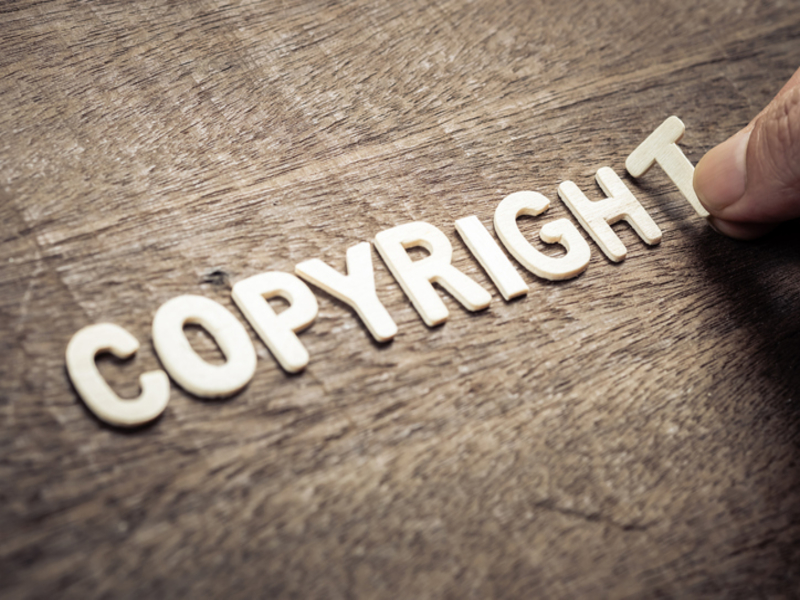Copyright (or author’s right) is a legal term used to describe the rights that creators have over their literary, artistic, musical, cinematograph films and sound recording from unauthorized use.
It protects original works of authorship including literary, dramatic, musical, and artistic works, such as poetry, novels, movies, songs, computer software, and architecture. Copyright does not protect facts, ideas, systems, general public knowledge, or methods of operation, although it may protect the way these things are expressed. Copyright law in India is governed by the provisions of the Copyright Act, 1957.
Copyright does not ordinarily protect titles by themselves or names, short word combinations, slogans, short phrases, methods, plots, or factual information. Copyright does not protect ideas or concepts, to get the protection of copyright a work must be original. Acquisition of copyright is automatic and it does not require any formality, as copyright comes into existence as soon as a work is created and no formality is required to be completed for acquiring copyright.
However, the certificate of registration of copyright and the entries made therein serve as prima facie evidence in a court of law with reference to dispute relating to ownership of copyright and therefore, it is highly recommended, that prior to starting the use of the work one should get the copyright registered.
BENEFITS OF REGISTERING COPYRIGHTS
- Prevention of monetary loss
One of the biggest benefits of copyright protection is preventing losses arising from copies being made of the original work. Violation of copyright registration is commonly known as ‘piracy’ – in India, all of us are familiar with the word. ‘Pirated’ books, DVDs, music videos are commonly available on the streets of most major cities. Not only are these shoddily produced, but they also lead to enormous losses for publishers and authors.
- Legal protection:
The act of registration gives shelter to published work. Without such registration, it becomes difficult to prove the case of the owner in a court of law as the burden of proof lies on the complainant.
For example, an author may write a novel that is similar to one that was written earlier. But without copyright registration, it won’t be easy to prove that it was plagiarised in court. The onus is on the creator to prove authenticity.
- Pre-emptive measure
Another one of the benefits of a copyright is that the registration is on record so that it dissuades others from making unauthorized use of your work. If you discover that someone is copying your work, you can send a ‘Cease and Desist’ notice/infringement notice.
- The incentive to create
Perhaps one of the biggest benefits of copyright law is that it fosters an atmosphere of creativity and innovation.
For example, an information technology company can spend millions developing new software. It will do so in the expectation of making money, and copyright law ensure that it can reap the benefits. MICROSOFT does not allow the full feature usage of its software without subscribing to the said software.
- Allows Transfer of Rights
A duly registered copyright enables the owner to sell/ pass/ or transfer the right of his/ her work to another person.
- Prestige
Another advantage of copyright protection is that it gives the holder the prestige that a certain work belongs to him or her.
Kinds of work eligible for copyright protection in India

In India, the work eligible for copyright registration must fall in either of the areas as follows:

- Musical Works.
- Cinematography Films.
- Literary Works, such as Manuscripts and Books.
- Fashion designs.
- Performances.
- Artistic works, such as Paintings.
- Website.
- Broadcast on Radio and Television.
- Published Editions.
- Computer Software and other computer programs and compilations, etc.
Need for Copyright Registration
Legal Protection
A Registered Copyright acts as evidence in the eyes of the law. It helps in protection from possible unauthorized use or infringement and makes it easier to file a lawsuit in a court of law.
Branding or Goodwill
A Registered Copyright is used for creating and building a sense of goodwill regarding the quality of the creation in the minds of the customers.
Protection after Creators Death
A duly registered copyright protects the right of a creator after his/ her death as well. That means the validity of copyright is higher than any other intellectual property right. Moreover, registered copyright remains valid for a period of 60 years after the death of the creator.
Publicity of Owner
The process of registration makes a work searchable across the world in the Copyright Registry Database and thereby granting wider protection from unauthorized use.
Restricts Unauthorized Reproduction
A duly registered copyright provides an exclusive right to the owner and prevents illegal reproduction of his/her work.
Creation of Asset
Registered Copyright denotes as one of the pillars of IPR (Intellectual Property Rights), just like Patents and Trademark. Moreover, the same can easily be Franchised, Traded, and commercially engaged.
Establishes Market Creditability
Registered copyright will establish and increase the market credibility of particular content or work and will protect the work from being copied by any other person as well.
Conclusion
Registration of a copyright is important to protect the work from unauthorized use or copying as it is prima facie evidence to prove the ownership of the work and it also provides the owner of the registered copyright to avail the maximum benefit by licensing, assigning, and raising capital. Registration is not an essential element for copyright, but it protects infringement of the owner’s right. Hence, it is highly advisable to register the copyright to protect the work and extract maximum benefit from the work.
For information on the Copyright application and registration process, please see the article on Registration of Copyright in India.
A common misconception among the masses is that Copyrights and Trademarks are the same. (Read about Trademarks here.) For more information, please email us at [email protected]


